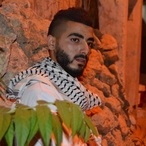19 oct 2015
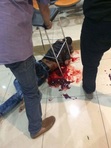
Police say they will try to identify and locate crowd who beat and fatally wounded Eritrean mistaken for terrorist, examining cell phone and security footage.
Police announced on Monday that they would work to identify and locate civilians who fatally wounded an Eritrean who was mistaken for a terrorist during the Sunday evening terror attack at the Be'er Sheva central bus terminal. Investigators plan to examine videos taken by witnesses and captured on security cameras. Police noted that they were searching specifically for people who assaulted the Eritrean man after he was incapacitated by a gunshot wound and clearly no longer posed a threat. The security officer who suspected the victim was a terrorist and shot him will not, said police, be investigated. It is unclear what charges these individuals might face and whether they would end up being indicted. After the man was shot by a security officer and lay incapacitated, people beat him, threw benches and chairs at him, kicking him, spat on him and cursed at him. Police officers on the scene, as well as some civilians, tried to keep attackers at bay at bay. Paramedics trying to evacuate the Eritrean to the hospital ran into objection |
from the crowds at the scene, who blocked their way and called out "Death to Arabs," "Arabs out!" and "Am Israel Hai" ("The people of Israel still live"). He was taken in serious condition to Soroka Medical Center, where he died of his wounds early Monday morning.
"People took out their rage on the wounded Eritrean and abused him," said a witness. "We thought he was one of the terrorists. He was shot in the legs and the real terrorist ran outside.
"People took out their rage on the wounded Eritrean and abused him," said a witness. "We thought he was one of the terrorists. He was shot in the legs and the real terrorist ran outside.
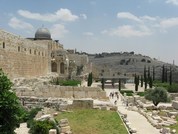
The Aqsa Foundation for Endowments and Heritage has warned of the repercussions of the recent Israeli court decision to authorize the Zionist settler society Elad to operate the Umayyad Palaces area at the southern wall of the Aqsa Mosque.
In a press release on Sunday, the foundation said that this Israeli decision would increase the risks threatening the Aqsa Mosque and the Islamic sites around it.
It noted that Elad society has been embarking for years on carrying out excavations and diggings beneath the Aqsa Mosque and the neighborhoods around it.
The areas adjacent to the southern and western walls of the Aqsa Mosque have been vulnerable, since the Old City was occupied in 1967, to dozens of Israeli violations and diggings.
Many Arab and Islamic antiquities and ancient structures have also been destroyed since then, including the Umayyad Palaces, which was turned into Jewish sites.
In a press release on Sunday, the foundation said that this Israeli decision would increase the risks threatening the Aqsa Mosque and the Islamic sites around it.
It noted that Elad society has been embarking for years on carrying out excavations and diggings beneath the Aqsa Mosque and the neighborhoods around it.
The areas adjacent to the southern and western walls of the Aqsa Mosque have been vulnerable, since the Old City was occupied in 1967, to dozens of Israeli violations and diggings.
Many Arab and Islamic antiquities and ancient structures have also been destroyed since then, including the Umayyad Palaces, which was turned into Jewish sites.
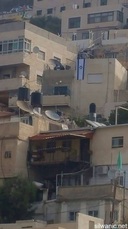
The settlement organization, Ateerat Cohanim, seized two houses in the area of Batn Al-Hawa in Silwan south of Al-Aqsa Mosque on Monday morning.
Wadi Hilweh Information Center_Silwan explained that large Israeli forces including Special Forces, police, dogs’ unit and employees of Ateerat Cohanim raided the neighborhood of Batn Al-Hawa supported by a helicopter. They surrounded two houses owned by Abu Nab family to execute the evacuation order in favor of the settlement organization which claims ownership.
Zuheir Rajabi, head of Batn Al-Hawa committee, explained to the center that large Israeli forces raided the houses of Abdullah Abu Nab and his brother Sabri. They evacuated the residents using force and used pepper gas towards the elderly Abdullah Abu Nab and detained him without providing him with any treatment and then started to remove the furniture and seized the houses; they prevented anybody from leaving his house or walking in the neighborhood.
Rajabi added that four individuals live in Abdullah’s house while 5 individuals live in Sabri’s house.
Rajabi also explained that the settlement organization claim ownership of the houses before 1948 when they used to be a Jewish synagogue. The family changed the nature of the houses and added new building to it. In 2002, settlers asked to get the building claiming that the tenant lost the “protected tenant” classification after they added to the building and requested to demolish the new building and pay rent to the settlers. Several evacuation orders were issued against Abu Nab family and the last order gave them until 25/10/2015 to evacuate the building.
The houses of Abu Nab family fall within the plan of Ateerat Cohanim to seize 5200 square meters from the lands of the Middle Neighborhood (area of Batn Al-Hawa) under the pretext of ownership by Yemen Jews since 1881. They divided the area into 6 sections numbered 73, 75, 88, 95, 96 and 97. The settlement organization claim that the Israeli Supreme Court acknowledged Yemen settlers’ ownership of the land of Batn Al-Hawa.
The center explained that the land has between 30-35 residential buildings where more than 80 families consisting of nearly 300 individuals live. All the residents have been living in the neighborhood for many years after buying the lands and property from their previous owners.
Wadi Hilweh Information Center_Silwan explained that large Israeli forces including Special Forces, police, dogs’ unit and employees of Ateerat Cohanim raided the neighborhood of Batn Al-Hawa supported by a helicopter. They surrounded two houses owned by Abu Nab family to execute the evacuation order in favor of the settlement organization which claims ownership.
Zuheir Rajabi, head of Batn Al-Hawa committee, explained to the center that large Israeli forces raided the houses of Abdullah Abu Nab and his brother Sabri. They evacuated the residents using force and used pepper gas towards the elderly Abdullah Abu Nab and detained him without providing him with any treatment and then started to remove the furniture and seized the houses; they prevented anybody from leaving his house or walking in the neighborhood.
Rajabi added that four individuals live in Abdullah’s house while 5 individuals live in Sabri’s house.
Rajabi also explained that the settlement organization claim ownership of the houses before 1948 when they used to be a Jewish synagogue. The family changed the nature of the houses and added new building to it. In 2002, settlers asked to get the building claiming that the tenant lost the “protected tenant” classification after they added to the building and requested to demolish the new building and pay rent to the settlers. Several evacuation orders were issued against Abu Nab family and the last order gave them until 25/10/2015 to evacuate the building.
The houses of Abu Nab family fall within the plan of Ateerat Cohanim to seize 5200 square meters from the lands of the Middle Neighborhood (area of Batn Al-Hawa) under the pretext of ownership by Yemen Jews since 1881. They divided the area into 6 sections numbered 73, 75, 88, 95, 96 and 97. The settlement organization claim that the Israeli Supreme Court acknowledged Yemen settlers’ ownership of the land of Batn Al-Hawa.
The center explained that the land has between 30-35 residential buildings where more than 80 families consisting of nearly 300 individuals live. All the residents have been living in the neighborhood for many years after buying the lands and property from their previous owners.
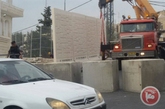
Israeli forces, on Sunday, began installing a large concrete wall in occupied East Jerusalem to separate the Palestinian neighborhood of Jabal al-Mukabbir from the illegal Israeli settlement of Armon Hanatziv.
Witnesses told Ma'an that Israeli forces helped unload huge concrete blocks in the neighborhood, including the notorious T-shaped blocks used in Israel's illegal separation wall that surrounds and cuts through the occupied West Bank.
Most of the concrete blocks are two meters high, witnesses, and were set up in streets near the illegal Israeli settlement of Armon Hanatziv, also known as East Talpiot.
Residents of Jabal al-Mukabbir said that four days earlier, on Wednesday, Israeli forces closed all routes to the neighborhood with cement blocks and set up a checkpoint at the main entrance.
Nearly all Palestinian neighborhoods across occupied East Jerusalem have seen severe movement restrictions imposed by Israel's security cabinet following a series of attacks on Israelis.
Late on Tuesday, Israel’s security cabinet announced that Israeli police would be entitled to "impose a closure on, or to surround, centers of friction and incitement in Jerusalem, in accordance with security considerations."
The cabinet also gave approval for the revocation of residency status for Palestinians who carry out attacks as well as the police closure of occupied East Jerusalem.
Israeli rights group B'Tselem has called the Israeli government’s response to recent escalation in the area as "the very inverse of what ought to be done" toward ending the violence.
"The events of recent weeks cannot be viewed in a vacuum, isolated from the reality of the ongoing, daily oppression of 4 million people, with no hope of change in sight," the group said in a statement on Tuesday.
At least seven Israelis and 42 Palestinians have been killed in violence that has escalated since the beginning of October.
Israeli settlers renewed their attacks on the eastern Hebron area on Sunday evening, hours after they carried out a similar attack, according to local sources.
More than 200 Israeli settlers attacked the Palestinian villages of Wad al-Haseen and Wad al-Nasara near the illegal Israeli settlement of Kiryat Arba, overnight, in the eastern Hebron district of the occupied southern West Bank, locals and medics said.
During the attack, Israeli settlers threw stones and firebombs at Palestinian homes and injured at least three people, two of which were minors, while Israeli forces later shot and injured one Palestinian with live fire.
An Israeli army spokesperson said she did not have reports of any injuries with live fire.
The spokesperson said clashes between Palestinians and Israelis broke out in the area, after which Israeli forces "arrived at the scene anddispersedthe clashes using riot dispersal means."
Kayed Daana, one of the residents whose home was attacked told Ma’an that dozens of Israeli settlers attacked her neighborhood and injured at least three of her neighbors who have been identified as 40-year-old Imad and two minors, Abdullah, 13, and Muhammad, 17.
Muhammad's injuries were the most serious of the three, as he was hit in the chest with one of the fire bombs, medics said.
Daana told Ma'an News Agency that she would like to urge the International Red Cross and others in the international community intervene against Israeli violations and attacks on Palestinians.
Bassam al-Jabri, one of the residents, said he saw the attacking Israeli settlers cutting the blockade fence that separates the illegal Israeli settlement of Kiryat Arab from nearby Palestinian homes, while under the protection of the Israeli troops before they attacked his neighborhood with fire bombs.
Al-Jabri said his house was one of those set ablaze, but that he and his neighbors were able to put the fire out before the fire was able to damage his whole home.
During the attacks, Palestinian villagers fled to their local mosques and used the mosque amplifier to call for help from neighboring Palestinian villages and communities, who responded to their calls. Israeli forces then got involved, shooting tear gas at Palestinians who showed up to help.
Community member Farid al-Razim, told Ma’an that villagers in his area were attacked by Israeli settlers with firebombs, while Israeli forces were shooting tear gas, and that one of the Palestinians from a neighboring village who had come to help was shot and injured with live fire.
While relations between Palestinian residents and Israeli settlers in the occupied West Bank are normally tense, thesituation has been significantly deteriorating since settlers’ caught fire a home belonging to the Duwabsha family in Nablus on July 31.
An 18-month-old toddler was burned alive during the attack, while his mother and father succumbed to their burn wounds while being treated at separate hospitals. The family's four-year-old son is the only remaining survivor of the attack.
On Oct. 1, suspected Palestinians shot and killed Eitam and Naama Henkin, two settlers who were driving between the illegal settlements of Itamar and Elon More in an area near Huwwara in Nablus. Their four children, aged between four months and nine years, were found unharmed in the back of the car.
It is speculated that the shootings were a revenge attack on Israeli settlers, following months of increased restrictions at the Al-Aqsa Mosque compound and calls from right-wing Jewish groups, urging their supporters to visit the compound, which is venerated by Jews as the Temple Mount. Following the shooting, hundreds of Israeli settlers rioted across the occupied West Bank, with multiple attacks reported on Palestinian homes and vehicles.
Palestinian towns and villages in the Nablus area are surrounded by Israeli settlements and outposts, many of which are protected by the Israeli military and have gained notoriety for being comprised of the most extremist settlers.
The Palestinian government has no jurisdiction over Israelis in the West Bank, and violent acts carried out by Israeli settlers often occur in the presence of Israeli military forces who rarely act to protect Palestinian residents.
Palestinians are therefore left to fend for themselves as few options for their personal security remain.
While Israeli forces will detain a Palestinian in the occupied West Bank for possessing a knife or gun, Israelis living in the same area are legally able to carry such weapons.
Rights groups have criticized Israel for implementing different legal systems for Palestinians and Israeli settlers living in the same area.
Such practices, they say, protect the expansion of settlements while systematically removing the ability for Palestinians to move freely throughout the occupied territory.
Settlers recently stepped up their attacks against Palestinians in the West Bank, including Jerusalem, amid growing tension and renewing clashes between Palestinians and the Israeli army and police.
Clashes have been witnessed across the West Bank, including Jerusalem, and Gaza, as well as in Arab communities inside the occupied 1948 land, against the backdrop of Israel’s repeated assaults against al-Aqsa mosque compound in Jerusalem.
Israel has been enforcing a temporal division on the compound, the third holiest place in Islam, which ignited strong feelings of anger among Palestinians.
Settlements are illegal under international law as they violate Article 49 of the Fourth Geneva Convention, which prohibits the transfer of the occupying power’s civilian population into occupied territory.
Witnesses told Ma'an that Israeli forces helped unload huge concrete blocks in the neighborhood, including the notorious T-shaped blocks used in Israel's illegal separation wall that surrounds and cuts through the occupied West Bank.
Most of the concrete blocks are two meters high, witnesses, and were set up in streets near the illegal Israeli settlement of Armon Hanatziv, also known as East Talpiot.
Residents of Jabal al-Mukabbir said that four days earlier, on Wednesday, Israeli forces closed all routes to the neighborhood with cement blocks and set up a checkpoint at the main entrance.
Nearly all Palestinian neighborhoods across occupied East Jerusalem have seen severe movement restrictions imposed by Israel's security cabinet following a series of attacks on Israelis.
Late on Tuesday, Israel’s security cabinet announced that Israeli police would be entitled to "impose a closure on, or to surround, centers of friction and incitement in Jerusalem, in accordance with security considerations."
The cabinet also gave approval for the revocation of residency status for Palestinians who carry out attacks as well as the police closure of occupied East Jerusalem.
Israeli rights group B'Tselem has called the Israeli government’s response to recent escalation in the area as "the very inverse of what ought to be done" toward ending the violence.
"The events of recent weeks cannot be viewed in a vacuum, isolated from the reality of the ongoing, daily oppression of 4 million people, with no hope of change in sight," the group said in a statement on Tuesday.
At least seven Israelis and 42 Palestinians have been killed in violence that has escalated since the beginning of October.
Israeli settlers renewed their attacks on the eastern Hebron area on Sunday evening, hours after they carried out a similar attack, according to local sources.
More than 200 Israeli settlers attacked the Palestinian villages of Wad al-Haseen and Wad al-Nasara near the illegal Israeli settlement of Kiryat Arba, overnight, in the eastern Hebron district of the occupied southern West Bank, locals and medics said.
During the attack, Israeli settlers threw stones and firebombs at Palestinian homes and injured at least three people, two of which were minors, while Israeli forces later shot and injured one Palestinian with live fire.
An Israeli army spokesperson said she did not have reports of any injuries with live fire.
The spokesperson said clashes between Palestinians and Israelis broke out in the area, after which Israeli forces "arrived at the scene anddispersedthe clashes using riot dispersal means."
Kayed Daana, one of the residents whose home was attacked told Ma’an that dozens of Israeli settlers attacked her neighborhood and injured at least three of her neighbors who have been identified as 40-year-old Imad and two minors, Abdullah, 13, and Muhammad, 17.
Muhammad's injuries were the most serious of the three, as he was hit in the chest with one of the fire bombs, medics said.
Daana told Ma'an News Agency that she would like to urge the International Red Cross and others in the international community intervene against Israeli violations and attacks on Palestinians.
Bassam al-Jabri, one of the residents, said he saw the attacking Israeli settlers cutting the blockade fence that separates the illegal Israeli settlement of Kiryat Arab from nearby Palestinian homes, while under the protection of the Israeli troops before they attacked his neighborhood with fire bombs.
Al-Jabri said his house was one of those set ablaze, but that he and his neighbors were able to put the fire out before the fire was able to damage his whole home.
During the attacks, Palestinian villagers fled to their local mosques and used the mosque amplifier to call for help from neighboring Palestinian villages and communities, who responded to their calls. Israeli forces then got involved, shooting tear gas at Palestinians who showed up to help.
Community member Farid al-Razim, told Ma’an that villagers in his area were attacked by Israeli settlers with firebombs, while Israeli forces were shooting tear gas, and that one of the Palestinians from a neighboring village who had come to help was shot and injured with live fire.
While relations between Palestinian residents and Israeli settlers in the occupied West Bank are normally tense, thesituation has been significantly deteriorating since settlers’ caught fire a home belonging to the Duwabsha family in Nablus on July 31.
An 18-month-old toddler was burned alive during the attack, while his mother and father succumbed to their burn wounds while being treated at separate hospitals. The family's four-year-old son is the only remaining survivor of the attack.
On Oct. 1, suspected Palestinians shot and killed Eitam and Naama Henkin, two settlers who were driving between the illegal settlements of Itamar and Elon More in an area near Huwwara in Nablus. Their four children, aged between four months and nine years, were found unharmed in the back of the car.
It is speculated that the shootings were a revenge attack on Israeli settlers, following months of increased restrictions at the Al-Aqsa Mosque compound and calls from right-wing Jewish groups, urging their supporters to visit the compound, which is venerated by Jews as the Temple Mount. Following the shooting, hundreds of Israeli settlers rioted across the occupied West Bank, with multiple attacks reported on Palestinian homes and vehicles.
Palestinian towns and villages in the Nablus area are surrounded by Israeli settlements and outposts, many of which are protected by the Israeli military and have gained notoriety for being comprised of the most extremist settlers.
The Palestinian government has no jurisdiction over Israelis in the West Bank, and violent acts carried out by Israeli settlers often occur in the presence of Israeli military forces who rarely act to protect Palestinian residents.
Palestinians are therefore left to fend for themselves as few options for their personal security remain.
While Israeli forces will detain a Palestinian in the occupied West Bank for possessing a knife or gun, Israelis living in the same area are legally able to carry such weapons.
Rights groups have criticized Israel for implementing different legal systems for Palestinians and Israeli settlers living in the same area.
Such practices, they say, protect the expansion of settlements while systematically removing the ability for Palestinians to move freely throughout the occupied territory.
Settlers recently stepped up their attacks against Palestinians in the West Bank, including Jerusalem, amid growing tension and renewing clashes between Palestinians and the Israeli army and police.
Clashes have been witnessed across the West Bank, including Jerusalem, and Gaza, as well as in Arab communities inside the occupied 1948 land, against the backdrop of Israel’s repeated assaults against al-Aqsa mosque compound in Jerusalem.
Israel has been enforcing a temporal division on the compound, the third holiest place in Islam, which ignited strong feelings of anger among Palestinians.
Settlements are illegal under international law as they violate Article 49 of the Fourth Geneva Convention, which prohibits the transfer of the occupying power’s civilian population into occupied territory.
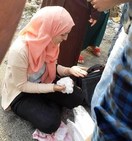
A Palestinian girl suffered moderate injuries all over her body after an Israeli settler deliberately ran over her at the entrance to Aroub refugee camp in al-Khalil.
Rulla Banat, 18, suffered injuries and bruises all over her body after being deliberately hit by an Israeli settler’s car.
Following the attack, violent clashes erupted across the city between local youths and Israeli forces. At least one youth was detained during the clashes.
Israeli settlers have always been protected by soldiers when they attack Palestinians, and vandalize their homes, vehicles, and agricultural land.
Rulla Banat, 18, suffered injuries and bruises all over her body after being deliberately hit by an Israeli settler’s car.
Following the attack, violent clashes erupted across the city between local youths and Israeli forces. At least one youth was detained during the clashes.
Israeli settlers have always been protected by soldiers when they attack Palestinians, and vandalize their homes, vehicles, and agricultural land.

Unknown gunmen have opened fire Sunday evening at an Israeli car near Hawara checkpoint at the entrance to Nablus city.
Armed men have opened fire at an Israeli car before fleeing the scene, eyewitnesses said.
Dozens of Israeli troops reached the area and carried out combing operations looking for the suspects, the sources added.
According to Israeli media sources, no injuries were reported during the alleged attack.
Shortly after the attack, Israeli forces closed the checkpoint and prevented the people's movement in both directions.
Armed men have opened fire at an Israeli car before fleeing the scene, eyewitnesses said.
Dozens of Israeli troops reached the area and carried out combing operations looking for the suspects, the sources added.
According to Israeli media sources, no injuries were reported during the alleged attack.
Shortly after the attack, Israeli forces closed the checkpoint and prevented the people's movement in both directions.
18 oct 2015
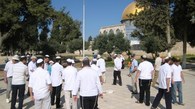
Groups of extremist settlers stormed on Sunday al-Aqsa Mosque under tight security measures by Israeli police.
Israeli forces have been imposing tightened security measures at the various gates of the holy site for over a month as well as barring Palestinian youths under the age of 35 from accessing the Mosque.
On the other hand, a Jewish group called “Students for the Temple of Solomon” called on settlers to carry out a large-scale incursion into al-Aqsa Mosque on Monday without specifying time.
Israeli forces have been imposing tightened security measures at the various gates of the holy site for over a month as well as barring Palestinian youths under the age of 35 from accessing the Mosque.
On the other hand, a Jewish group called “Students for the Temple of Solomon” called on settlers to carry out a large-scale incursion into al-Aqsa Mosque on Monday without specifying time.
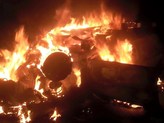
An Israeli car belonging to extremist Jewish settlers was burned and one of them was injured during violent skirmishes at dawn Sunday with local young men near the mausoleum of Joseph's tomb, east of Nablus city.
Eyewitnesses told the Palestinian Information Center (PIC) that a horde of Jewish extremists aboard cars entered area of the mausoleum suddenly, which prompted the Palestinian Authority police to rush to the place and try to prevent them from staying there because there was no prior coordination with the Palestinian security authorities.
They elaborated that the settlers verbally attacked the Palestinian policemen and tried to forcibly go into the shrine before young bystanders intervened and threw stones at the settlers.
They added that one of the settlers suffered slight injuries when he was beaten by a young man and one of their car was torched during the events, which subsided after Israeli troops arrived at the scene and evacuated the settlers.
Eyewitnesses told the Palestinian Information Center (PIC) that a horde of Jewish extremists aboard cars entered area of the mausoleum suddenly, which prompted the Palestinian Authority police to rush to the place and try to prevent them from staying there because there was no prior coordination with the Palestinian security authorities.
They elaborated that the settlers verbally attacked the Palestinian policemen and tried to forcibly go into the shrine before young bystanders intervened and threw stones at the settlers.
They added that one of the settlers suffered slight injuries when he was beaten by a young man and one of their car was torched during the events, which subsided after Israeli troops arrived at the scene and evacuated the settlers.
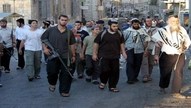
A number of Jewish settlers at dawn Sunday tried to kidnap two Palestinian citizens from Burin town, south of Nablus city, as they were aboard a car at the entrance to the town.
Ghassan Daghlas, the settlement affairs official in the northern West Bank, told the Palestinian Information Center (PIC) that a group of settlers chased with their vehicle a Palestinian car and intercepted it near the entrance to Burin town.
Daghlas added that the settlers tried to snatch the driver and one passenger out of the car, but the latter resisted and drove away.
The two Palestinian citizens who escaped the kidnap attempt were identified as Yousuf and Arafa Annajjar.
The Palestinian official warned the citizens in the southern areas of Nablus to necessarily be cautious during their movement on the roads between the towns and villages there to avoid attempts by settlers to kidnap them.
Ghassan Daghlas, the settlement affairs official in the northern West Bank, told the Palestinian Information Center (PIC) that a group of settlers chased with their vehicle a Palestinian car and intercepted it near the entrance to Burin town.
Daghlas added that the settlers tried to snatch the driver and one passenger out of the car, but the latter resisted and drove away.
The two Palestinian citizens who escaped the kidnap attempt were identified as Yousuf and Arafa Annajjar.
The Palestinian official warned the citizens in the southern areas of Nablus to necessarily be cautious during their movement on the roads between the towns and villages there to avoid attempts by settlers to kidnap them.
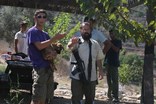
A Palestinian family has expressed fears that its little girl may have been kidnapped by Jewish settlers following her disappearance in Khirbat Rabud, southwest of Samu'a town in al-Khalil province.
The family of 13-year-old Tahani Rasmi appealed to local media outlets, human rights groups and the Palestinian security authorities to help find its missing child, who went missing on Saturday afternoon near the house.
It said that she might have been abducted by settlers from Otniel settlement, which is located near the village.
The family of 13-year-old Tahani Rasmi appealed to local media outlets, human rights groups and the Palestinian security authorities to help find its missing child, who went missing on Saturday afternoon near the house.
It said that she might have been abducted by settlers from Otniel settlement, which is located near the village.
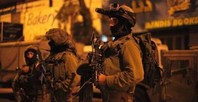
At least 15 Palestinians were kidnapped by the Israeli occupation forces (IOF) at dawn Sunday in an arbitrary mass-abduction campaign launched across cities of the West Bank.
The 15 Palestinians, arrested on allegations of involvement in anti-occupation activities, were all dragged to an Israeli detention center pending further investigation.
Five of those arrested were civilian youths from the West Bank province of Bethlehem.
15-year-old Udai al-Amour and Muhannad al-Amour were among the five Bethlehem captives, a PIC news reporter documented.
Meanwhile, a horde of 200 Israeli vandals stormed a Palestinian cultivated land in southern Bethlehem and seized it shortly afterwards.
Clashes burst out in Salfit after Israeli special forces and eight army jeeps stormed the city and raked through residential neighborhoods, targeting Palestinian civilian homes with tear gas canisters all the way through.
A number of Palestinians choked on tear gas and received field treatment.
Five more Palestinian youngsters, including ex-prisoner Ali Udwan, were arrested in Qalqilya, in the northern West Bank.
The Israeli occupation soldiers further nabbed two Palestinian civilians from al-Khalil’s western town of Awa. Both arrestees were dragged to an unknown location shortly afterwards.
Violent clashes reportedly flared up across al-Khalil city, where the IOF troops attacked Palestinian civilians, family homes, and schoolchildren with randomly-shot spates of tear gas canisters and rubber bullets.
A number of schoolchildren choked on tear gas in the process.
The assault culminated in a flying checkpoint abruptly pitched by the Israeli troops on the access road between northern al-Khalil and Bethlehem.
Over recent days, a number of Palestinian children and youths were kidnapped by the IOF in ongoing clashes across the West Bank.
The 15 Palestinians, arrested on allegations of involvement in anti-occupation activities, were all dragged to an Israeli detention center pending further investigation.
Five of those arrested were civilian youths from the West Bank province of Bethlehem.
15-year-old Udai al-Amour and Muhannad al-Amour were among the five Bethlehem captives, a PIC news reporter documented.
Meanwhile, a horde of 200 Israeli vandals stormed a Palestinian cultivated land in southern Bethlehem and seized it shortly afterwards.
Clashes burst out in Salfit after Israeli special forces and eight army jeeps stormed the city and raked through residential neighborhoods, targeting Palestinian civilian homes with tear gas canisters all the way through.
A number of Palestinians choked on tear gas and received field treatment.
Five more Palestinian youngsters, including ex-prisoner Ali Udwan, were arrested in Qalqilya, in the northern West Bank.
The Israeli occupation soldiers further nabbed two Palestinian civilians from al-Khalil’s western town of Awa. Both arrestees were dragged to an unknown location shortly afterwards.
Violent clashes reportedly flared up across al-Khalil city, where the IOF troops attacked Palestinian civilians, family homes, and schoolchildren with randomly-shot spates of tear gas canisters and rubber bullets.
A number of schoolchildren choked on tear gas in the process.
The assault culminated in a flying checkpoint abruptly pitched by the Israeli troops on the access road between northern al-Khalil and Bethlehem.
Over recent days, a number of Palestinian children and youths were kidnapped by the IOF in ongoing clashes across the West Bank.
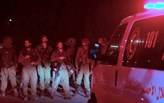
Hundreds of Israeli fanatic settlers overnight Saturday and at dawn Sunday have stormed residential neighborhoods in the southern West Bank city of al-Khalil and assaulted a number of civilian homes under military escort.
A PIC journalist quoted eye-witnesses as reporting that Israeli fanatic settler hordes attacked Palestinians’ family homes across al-Khalil province in the presence of the heavily-armed occupation troops.
The Israeli vandals further showered Palestinian civilian homes with rocks, shortly before they broke into the buildings and forced the native inhabitants out.
Palestinian child Abdullah Naser Da’na reportedly sustained wounds after he was hit with an empty bottle thrown by the Israeli settlers.
Another child and a 40-year-old civilian were also injured in the assault.
Palestinian locals launched cries for help via mosque loud speakers in the Old City of al-Khalil and pushed for an urgent intervention to defend their children against Israel’s mounting terrorism.
Hundreds of other settlers residing in the illegal Israeli settlements of Kiryat Arba and Kharsina flocked to al-Khalil’s northern entrance in an attempt to assault more civilian homes in Sa’ir town. The assaults continued until dawn time.
A group of anti-occupation activists said their appeals to the international community, the Red Crescent organization, and the Palestinian Liaison have gone unheard.
A series of military checkpoints was, meanwhile, randomly pitched some 100 meters away from the area so as to prevent Palestinians from reaching the scene and saving the casualties.
A PIC journalist quoted eye-witnesses as reporting that Israeli fanatic settler hordes attacked Palestinians’ family homes across al-Khalil province in the presence of the heavily-armed occupation troops.
The Israeli vandals further showered Palestinian civilian homes with rocks, shortly before they broke into the buildings and forced the native inhabitants out.
Palestinian child Abdullah Naser Da’na reportedly sustained wounds after he was hit with an empty bottle thrown by the Israeli settlers.
Another child and a 40-year-old civilian were also injured in the assault.
Palestinian locals launched cries for help via mosque loud speakers in the Old City of al-Khalil and pushed for an urgent intervention to defend their children against Israel’s mounting terrorism.
Hundreds of other settlers residing in the illegal Israeli settlements of Kiryat Arba and Kharsina flocked to al-Khalil’s northern entrance in an attempt to assault more civilian homes in Sa’ir town. The assaults continued until dawn time.
A group of anti-occupation activists said their appeals to the international community, the Red Crescent organization, and the Palestinian Liaison have gone unheard.
A series of military checkpoints was, meanwhile, randomly pitched some 100 meters away from the area so as to prevent Palestinians from reaching the scene and saving the casualties.
17 oct 2015
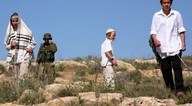
Dozens of Jewish settlers attacked at noon Saturday Palestinian farmers near Bourin town in southern Nablus city while picking olives.
Eyewitnesses told the PIC reporter that armed settlers from Yitzhar and Brakha outposts assaulted Palestinian farmers and tried to expel them out of their lands by force under gun threat.
A unit of the Israeli army reached the place and supported the fanatic settlers in making Palestinian farmers leave work in their lands, the eyewitnesses pointed out. No clashes or injuries were reported.
Eyewitnesses told the PIC reporter that armed settlers from Yitzhar and Brakha outposts assaulted Palestinian farmers and tried to expel them out of their lands by force under gun threat.
A unit of the Israeli army reached the place and supported the fanatic settlers in making Palestinian farmers leave work in their lands, the eyewitnesses pointed out. No clashes or injuries were reported.
Paramedics with the Palestinian Red Crescent were denied access to the dying teen, and Israeli troops took the body away without allowing any medical personnel or family members near the body.
Although the Israeli paramilitary settler who executed the teen claimed that Fadel came at him with a knife, no evidence of this claim has been produced. In the past, on numerous occasions, initial claims that Palestinians attacked Israelis have turned out, on later investigation, to be false.
Local resident Mufeed Sharabati told reporters with the Ma'an News Agency that after the execution of Fadel on the street, Israeli paramilitary settlers were seen walking around the streets of Hebron distributing candy to one another in celebration of the execution.
Israeli forces did not take the killer into custody.
Shuhada Street, where the murder took place, is the site of a long history of Israeli paramilitary violence against the indigenous Palestinian population.
Following the massacre of 27 Palestinian civilians praying in the Ibrahimi Mosque in central Hebron in 1994 by American doctor Baruch Goldstein, Israeli authorities sectioned off the mosque and made half of it into a synagogue. Since that time, the Israeli government has allowed and promoted Israeli paramilitary settlement colonies in the center of the city of Hebron.
In Shuhada Street, Israeli paramilitary settlers took over the top floors of a number of Palestinian homes, and used these as a base from which to attack and torment the Palestinians as they shopped in the central market of Hebron, located on Shuhada Street. For years, the settlers dropped rocks, eggs, and human excrement onto Palestinian shoppers and schoolchildren on a nearly-daily basis, in an effort to push Palestinians out of the area. Palestinians who lived and worked below put up nets to try to catch the objects thrown at them by the paramilitary forces above.
Israeli military authorities allowed the harassment to continue without consequence, and most Palestinian shopkeepers were eventually pushed out of Shuhada Street. The paramilitary settlers who have moved into the area over the past twenty years are all heavily armed, and most are adherents of an extreme right-wing ideology that consider Baruch Goldstein a hero, and follow the ideas of the anti-Arab Rabbi Meir Kahane, who called for the complete expulsion of the Palestinian people from their land, and justified the killing of non-Jews on biblical grounds.
Now, Shuhada Street is virtually deserted, with most Palestinians afraid to walk on it because of fear of attack by paramilitary settlers. But it remains the central street of Hebron, and Palestinian residents often need to walk there to get where they are going in the city.
Thousands of Israeli troops are deployed in the area to protect the hundreds of paramilitary settlers who have taken over Palestinian land in the center of Hebron and claimed it as a colony of Israel.
Saturday's killing of Fadel al-Qawasmi marks the 38th Palestinian death in the month of October, but he is the first to be killed by a paramilitary settler this month. The others were all killed by Israeli soldiers or police.
Just three weeks ago, very near to the location of today's murder, an 18-year old Palestinian girl, Hadeel al-Hashlamoun, was shot and killed by an Israeli soldier who shot her from ten feet away, execution style. Initially, Israeli authorities tried to claim that Hadeel had a knife, but video footage of the incident emerged, showing the girl with both her hands visible, and nothing in them.
Amnesty International condemned the killing of the girl as "extrajudicial assassination", and called for an investigation. In its statement about that incident, Amnesty International said, "Even if al-Hashlamoun did have a knife, Israeli soldiers, who are protected with body armour and heavily equipped with advanced weapons, could have controlled the situation and arrested her without threatening her life. Open fire regulations of the Israeli military in the occupied West Bank allow soldiers to open fire only when their lives are in imminent danger, and Amnesty International concludes that this was not the case in the shooting of al-Hashlamoun, as she was standing still and separated from the soldiers by a metal barrier. There was no attempt to arrest al-Hashlamoun, according to the eyewitnesses, or to use non-lethal alternatives.
"To then shoot al-Hashlamoun again multiple times as she lay wounded on the ground indicates that her killing was an extrajudicial execution. Unlawful and deliberate killings carried out by order of government or military officials, or with their complicity or acquiescence, amount to extrajudicial executions, which are prohibited at all times and constitute crimes under international law. An extrajudicial execution would also constitute a wilful killing, which is a grave breach of the Fourth Geneva Convention, which applies to Israel’s long-standing military occupation of the Occupied Palestinian Territories, and a war crime."
Since the killing of Hadeel al-Hashlamoun on September 22nd, Israeli forces have killed 37 Palestinians -- of these, around one-third were claimed to have had knives in their possession. All of those killed fall under the category of extrajudicial assassination, according to international law.
Two Palestinian teenagers killed by Israeli gunfire in J'lem and al-Khalil
Two Palestinian young men on Saturday morning were killed by Israeli gunfire in separate incidents in the occupied cities of Jerusalem and al-Khalil.
Eyewitnesses told the Palestinian Information Center (PIC) that an armed Jewish settler opened fire with no reason at a Palestinian citizen near al-Dabuya outpost in al-Shuhada street of al-Khalil, affirming that he was left bleeding to death for half an hour on the ground.
They added that a large number of Israeli troops arrived at the scene and cordoned off the area.
The victim was identified as 18-year-old Fadel al-Qawasmeh.
In a separate incident, Israeli policemen killed another young man in east Jerusalem on allegations of his attempt to stab a settler.
The slain young man, 16-year-old Mu'taz Awaisat, was shot dead as he was walking near Armon Hanatziv outpost in Jabel Mukaber neighborhood, according to eyewitnesses.
Although the Israeli paramilitary settler who executed the teen claimed that Fadel came at him with a knife, no evidence of this claim has been produced. In the past, on numerous occasions, initial claims that Palestinians attacked Israelis have turned out, on later investigation, to be false.
Local resident Mufeed Sharabati told reporters with the Ma'an News Agency that after the execution of Fadel on the street, Israeli paramilitary settlers were seen walking around the streets of Hebron distributing candy to one another in celebration of the execution.
Israeli forces did not take the killer into custody.
Shuhada Street, where the murder took place, is the site of a long history of Israeli paramilitary violence against the indigenous Palestinian population.
Following the massacre of 27 Palestinian civilians praying in the Ibrahimi Mosque in central Hebron in 1994 by American doctor Baruch Goldstein, Israeli authorities sectioned off the mosque and made half of it into a synagogue. Since that time, the Israeli government has allowed and promoted Israeli paramilitary settlement colonies in the center of the city of Hebron.
In Shuhada Street, Israeli paramilitary settlers took over the top floors of a number of Palestinian homes, and used these as a base from which to attack and torment the Palestinians as they shopped in the central market of Hebron, located on Shuhada Street. For years, the settlers dropped rocks, eggs, and human excrement onto Palestinian shoppers and schoolchildren on a nearly-daily basis, in an effort to push Palestinians out of the area. Palestinians who lived and worked below put up nets to try to catch the objects thrown at them by the paramilitary forces above.
Israeli military authorities allowed the harassment to continue without consequence, and most Palestinian shopkeepers were eventually pushed out of Shuhada Street. The paramilitary settlers who have moved into the area over the past twenty years are all heavily armed, and most are adherents of an extreme right-wing ideology that consider Baruch Goldstein a hero, and follow the ideas of the anti-Arab Rabbi Meir Kahane, who called for the complete expulsion of the Palestinian people from their land, and justified the killing of non-Jews on biblical grounds.
Now, Shuhada Street is virtually deserted, with most Palestinians afraid to walk on it because of fear of attack by paramilitary settlers. But it remains the central street of Hebron, and Palestinian residents often need to walk there to get where they are going in the city.
Thousands of Israeli troops are deployed in the area to protect the hundreds of paramilitary settlers who have taken over Palestinian land in the center of Hebron and claimed it as a colony of Israel.
Saturday's killing of Fadel al-Qawasmi marks the 38th Palestinian death in the month of October, but he is the first to be killed by a paramilitary settler this month. The others were all killed by Israeli soldiers or police.
Just three weeks ago, very near to the location of today's murder, an 18-year old Palestinian girl, Hadeel al-Hashlamoun, was shot and killed by an Israeli soldier who shot her from ten feet away, execution style. Initially, Israeli authorities tried to claim that Hadeel had a knife, but video footage of the incident emerged, showing the girl with both her hands visible, and nothing in them.
Amnesty International condemned the killing of the girl as "extrajudicial assassination", and called for an investigation. In its statement about that incident, Amnesty International said, "Even if al-Hashlamoun did have a knife, Israeli soldiers, who are protected with body armour and heavily equipped with advanced weapons, could have controlled the situation and arrested her without threatening her life. Open fire regulations of the Israeli military in the occupied West Bank allow soldiers to open fire only when their lives are in imminent danger, and Amnesty International concludes that this was not the case in the shooting of al-Hashlamoun, as she was standing still and separated from the soldiers by a metal barrier. There was no attempt to arrest al-Hashlamoun, according to the eyewitnesses, or to use non-lethal alternatives.
"To then shoot al-Hashlamoun again multiple times as she lay wounded on the ground indicates that her killing was an extrajudicial execution. Unlawful and deliberate killings carried out by order of government or military officials, or with their complicity or acquiescence, amount to extrajudicial executions, which are prohibited at all times and constitute crimes under international law. An extrajudicial execution would also constitute a wilful killing, which is a grave breach of the Fourth Geneva Convention, which applies to Israel’s long-standing military occupation of the Occupied Palestinian Territories, and a war crime."
Since the killing of Hadeel al-Hashlamoun on September 22nd, Israeli forces have killed 37 Palestinians -- of these, around one-third were claimed to have had knives in their possession. All of those killed fall under the category of extrajudicial assassination, according to international law.
Two Palestinian teenagers killed by Israeli gunfire in J'lem and al-Khalil
Two Palestinian young men on Saturday morning were killed by Israeli gunfire in separate incidents in the occupied cities of Jerusalem and al-Khalil.
Eyewitnesses told the Palestinian Information Center (PIC) that an armed Jewish settler opened fire with no reason at a Palestinian citizen near al-Dabuya outpost in al-Shuhada street of al-Khalil, affirming that he was left bleeding to death for half an hour on the ground.
They added that a large number of Israeli troops arrived at the scene and cordoned off the area.
The victim was identified as 18-year-old Fadel al-Qawasmeh.
In a separate incident, Israeli policemen killed another young man in east Jerusalem on allegations of his attempt to stab a settler.
The slain young man, 16-year-old Mu'taz Awaisat, was shot dead as he was walking near Armon Hanatziv outpost in Jabel Mukaber neighborhood, according to eyewitnesses.
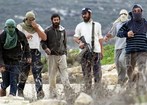
Palestinian ambassador to the UN Riyadh Mansour has demanded the Security Council to work on having the Jewish settlers divested of all weapons in their possession, pursuant to a previous UN resolution issued in this regard.
Mansour told a news conference at the UN headquarters on Friday that the Security Council must intervene immediately to stop Israel's violations against the Palestinians in the occupied territories.
Mansour stated that the Security Council had already adopted the "resolution 904" following the Ibrahimi Mosque massacre in al-Khalil city in 1994, which demanded Israel to provide protection for the Palestinians on their own land and disarming the settlers.
"We call again for implementing this resolution," the Palestinian official emphasized.
Mansour told a news conference at the UN headquarters on Friday that the Security Council must intervene immediately to stop Israel's violations against the Palestinians in the occupied territories.
Mansour stated that the Security Council had already adopted the "resolution 904" following the Ibrahimi Mosque massacre in al-Khalil city in 1994, which demanded Israel to provide protection for the Palestinians on their own land and disarming the settlers.
"We call again for implementing this resolution," the Palestinian official emphasized.
